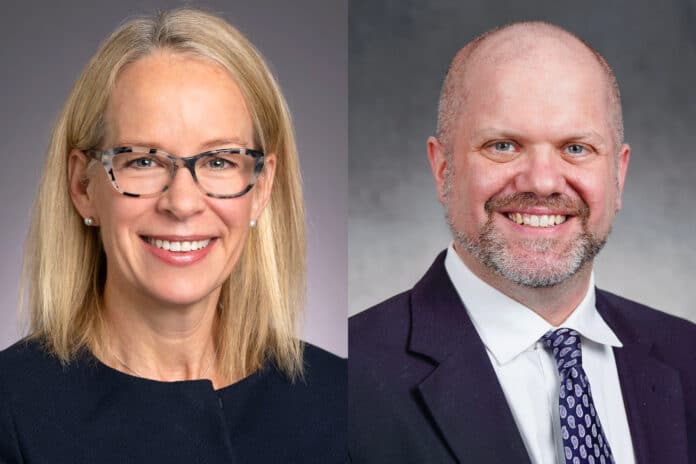
Two DFLers who have been pushing legislation that would allow doctors to prescribe “end of life” pills to terminally-ill people under certain circumstances are hoping this is the session they can make the bill a reality.
On Thursday, Jan. 25 the House Health Finance and Policy Committee will hold a hearing on HF1930, which its authors have coined the “End of Life Options Act.” That’s just more than two weeks before the official start to the legislative session begins on Feb. 12.
An agenda for the meeting posted this week on the House of Representatives website says “the committee intends to adopt” an amendment to the bill and then vote to advance the legislation. The House Health Finance and Policy Committee is expected to be the first of a few committees the bill would have to clear before reaching the House floor.
Gov. Tim Walz appeared to express support for the bill during a November interview with the Star Tribune. If the governor were to sign the legislation into law, Minnesota would become the 11th state in the nation to allow some terminally-ill people to self-administer medication that would proactively end their lives.
The proposal may have a tough time reaching Walz’s desk as the DFL holds just a one-seat majority in the Senate. In December, Sen. John Hoffman, DFL-Champlin, regarded as a moderate on many legislative issues, authored an opinion in the Star Tribune criticizing the bill which he called dangerous and said “would likely have serious consequences for vulnerable populations.”
Supporters, critics are lining up testifiers for Jan. 25 hearing
While the committee is inviting written, in-person and virtual testimony on the legislation, its committee administrator, House DFL Caucus staffer Josh Sande, is asking those wishing to testify to identify ahead of time whether they support or oppose the bill and if they are speaking on behalf of an organization.
The chief authors of the assisted suicide bill in the House and Senate are Rep. Mike Freiberg, DFL-Golden Valley, and Sen. Kelly Morrison, DFL-Deephaven.
Freiberg is an attorney in his sixth term in the House.
Morrison is a medical doctor in her first term in the Senate and is considered a frontrunner for the DFL endorsement to replace retiring Dean Phillips representing Minnesota’s Third Congressional District in the U.S. House of Representatives. In September, Morrison held a “Medical Aid in Dying” town hall in Minnetonka where she promised to work to pass the legislation in 2024.
While no Republicans have yet signed onto the bill, two dozen members of the House DFL caucus are listed as sponsors.
Bill sponsors include: Heather Edelson of Edina, Frank Hornstein of Minneapolis, Robert Bierman of Apple Valley, Athena Hollins of St. Paul, Amanda Hemmingsen-Jaeger of Woodbury, Kristin Bahner of Maple Grove, Steve Elkins of Bloomington, Larry Kraft of St. Louis Park, Liz Olson of Duluth, Cedrick Frazier of New Hope, Andy Smith of Rochester, Liz Reyer of Eagan, Patty Acomb of Minnetonka, Alicia Kozlowski of Duluth, Fue Lee of St. Paul, Jeff Brand of St. Peter, Cheryl Youakim of Hopkins, Hodan Hassan of Minneapolis, Jerry Newton of Coon Rapids, Jamie Becker-Finn of Roseville, Samantha Sencer-Mura of Minneapolis, Kristi Pursell of Northfield and Brad Tabke of Shakopee.
To date just five members of the Senate have signed onto the legislation. They include Morrison, Alice Mann of Edina, Liz Boldon of Rochester, Erin Murphy of St. Paul, and Jim Carlson of Eagan.
Freiberg, Morrison efforts backed by organization formerly known as Hemlock Society
Freiberg and Morrison have been promoting the legislation since 2022, but officially introduced the bill last March. Their efforts are being backed by the national “Compassion and Choices.” The Oregon-based organization, once known as the Hemlock Society, is helping push similar legislation in more than 30 other states. Oregon is well known for becoming the first state in the nation to enact “right to die” laws for certain terminally-ill patients.
Opponents of the bill include the Minnesota Catholic Conference and Minnesota Citizens Concerned for Life, who say the legislation is “dangerous, misguided, and extreme.” They sent out communications to supporters last week to ask for testimony to the committee in opposition to the bill.
Also, nationally-known Catholic Bishop Robert Barron, who leads the Diocese of Winona-Rochester, recently authored commentary in opposition to the legislation in Minnesota. He said the bill is “couched in language designed to assuage moral anxieties.” The Rochester Post-Bulletin published a story last week reporting on Barron’s public criticism of the legislation.
Hank Long
Hank Long is a journalism and communications professional whose writing career includes coverage of the Minnesota legislature, city and county governments and the commercial real estate industry. Hank received his undergraduate degree at the University of Minnesota, where he studied journalism, and his law degree at the University of St. Thomas. The Minnesota native lives in the Twin Cities with his wife and four children. His dream is to be around when the Vikings win the Super Bowl.
















